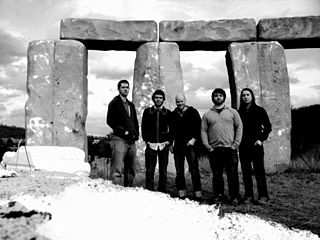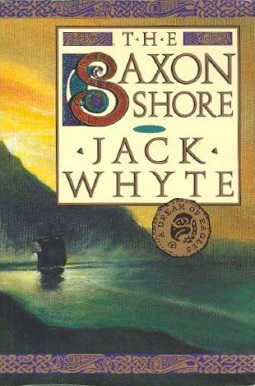Ælle is recorded in early sources as the first king of the South Saxons, reigning in what is now called Sussex, England, from 477 to perhaps as late as 514.
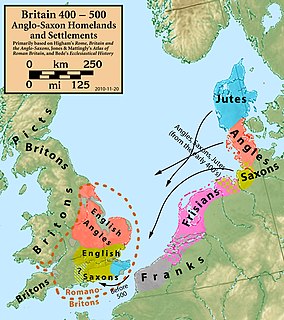
The Saxons were a Germanic people whose name was given in the early Middle Ages to a large country near the North Sea coast of what is now Germany. In the late Roman Empire, the name was used to refer to Germanic coastal raiders, and also as a word something like the later "Viking". In Merovingian times, continental Saxons were associated with the coast of what later became Normandy. Though sometimes described as also fighting inland, coming in conflict with the Franks and Thuringians, no clear homeland can be defined. There is possibly a single classical reference to a smaller homeland of an early Saxon tribe, but it is disputed. According to this proposal, the Saxons' earliest area of settlement is believed to have been Northern Albingia. This general area is close to the probable homeland of the Angles.
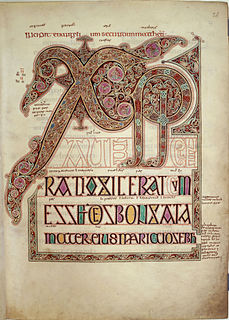
The Anglo-Saxons were a cultural group who inhabited Great Britain from the 5th century. They comprise people from Germanic tribes who migrated to the island from continental Europe, their descendants, and indigenous British groups who adopted many aspects of Anglo-Saxon culture and language; the cultural foundations laid by the Anglo-Saxons are the foundation of the modern English legal system and of many aspects of English society; the modern English language owes over half its words – including the most common words of everyday speech – to the language of the Anglo-Saxons. Historically, the Anglo-Saxon period denotes the period in Britain between about 450 and 1066, after their initial settlement and up until the Norman conquest. The early Anglo-Saxon period includes the creation of an English nation, with many of the aspects that survive today, including regional government of shires and hundreds. During this period, Christianity was established and there was a flowering of literature and language. Charters and law were also established. The term Anglo-Saxon is popularly used for the language that was spoken and written by the Anglo-Saxons in England and eastern Scotland between at least the mid-5th century and the mid-12th century. In scholarly use, it is more commonly called Old English.

Cerdic is cited in the Anglo-Saxon Chronicle as a leader of the Anglo-Saxon settlement of Britain, being the founder and first king of Saxon Wessex, reigning from 519 to 534 AD. Subsequent kings of Wessex were each claimed by the Chronicle to descend in some manner from Cerdic. His origin, ethnicity, and even his very existence have been extensively disputed.

Saxon are an English heavy metal band formed in 1977, in Barnsley. As one of the leaders of the new wave of British heavy metal, they had eight UK Top 40 albums in the 1980s including four UK Top 10 albums and two Top 5 albums. The band also had numerous singles in the UK Singles Chart and chart success all over Europe and Japan, as well as success in the United States. During the 1980s, Saxon established themselves as one of Europe's greatest metal acts. The band tour regularly and have sold more than 23 million albums worldwide. They are considered one of the classic metal acts, and have influenced a number of bands such as Metallica, Megadeth, Slayer, Anthrax, Testament, Exodus, Overkill, Mötley Crüe, Pantera, Helloween, Running Wild, Metal Church, Armored Saint, Dream Theater, Dokken, Skid Row, Sodom, Celtic Frost, Bathory, King Diamond and Death Angel.

The dog whelk, dogwhelk, or Atlantic dogwinkle, scientific name Nucella lapillus, is a species of predatory sea snail, a carnivorous marine gastropod in the family Muricidae, the rock snails.
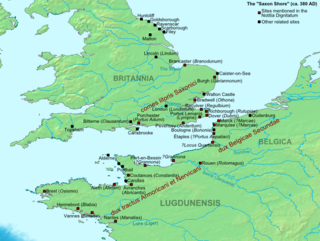
The Count of the Saxon Shore for Britain was the head of the Saxon Shore military command of the later Roman Empire.

Old Saxony is the original homeland of the Saxons in the northwest corner of modern Germany and roughly corresponds today to the modern German state of Lower Saxony, Westphalia, Nordalbingia and western Saxony-Anhalt.

Richborough Castle contains the ruins of a Roman Saxon Shore fort, collectively known as Richborough Fort or Richborough Roman Fort. It is situated in Richborough near Sandwich, Kent, in the United Kingdom.
Anglo-Saxon England was early medieval England, existing from the 5th to the 11th centuries from the end of Roman Britain until the Norman conquest in 1066. It consisted of various Anglo-Saxon kingdoms until 927 when it was united as the Kingdom of England by King Æthelstan. It became part of the short-lived North Sea Empire of Cnut the Great, a personal union between England, Denmark and Norway in the 11th century.
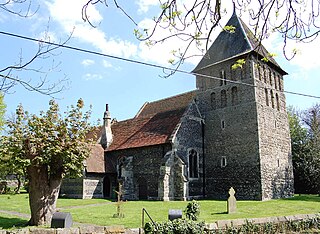
Corringham is an English town, with its commercial centre in smaller Stanford-Le-Hope immediately to its south-west. It is in the unitary authority of Thurrock and a traditional parish stretching from Horseshoe Bay in the Thames Estuary to Dry Street, south of Langdon Hills. It is in the far east of the borough.

Gariannonum, or Gariannum, was a Saxon Shore fort in Norfolk, England. The Notitia Dignitatum, a Roman Army “order of battle” from about AD 400, lists nine forts of the Saxon Shore in south and east England, among which one was called Gariannonor. It has been much discussed over the years in terms of spelling, purpose, and location.

Anderitum was a Saxon Shore fort in the Roman province of Britannia. The ruins adjoin the west end of the village of Pevensey in East Sussex, England. The fort was built in the 290s and was abandoned after it was sacked in 471. It was re-inhabited by Saxons and in the 11th century the Normans built a castle within the east end of the fort.
Oliver Chapoy is a musician/multi-instrumentalist/producer who resides in Brooklyn, New York. Oliver is known for his work as a former co-writer/collaborator with Experimental Pop group Warm Ghost, the instrumental band Saxon Shore and his collaborations with the likes of Helado Negro, Sinkane, Mikael Jorgensen (Wilco), Leverage Models & more. Oliver is also known for his performance in the group Shai Hulud. However he has been in other acts renowned for affecting the late 90's Florida hardcore, and metalcore scene tremendously. Oliver has also engineered records at Salad Days Studio for producer Brian McTernan, including records for Circa Survive and Bane.

Branodunum was the name of an ancient Roman fort to the east of the modern English village of Brancaster in Norfolk. Its Roman name derives from the local Celtic language, and may mean "fort of the raven".

Portus Lemanis, also known as Lemanae, was the Latin name of an ancient Roman fort, settlement and port in southern Kent. The modern village of Lympne derives its name from the ancient port.
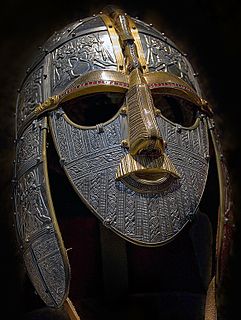
The Anglo-Saxon settlement of Britain changed the language and culture of most of what became England from Romano-British to Germanic. The Germanic-speakers in Britain, themselves of diverse origins, eventually developed a common cultural identity as Anglo-Saxons. This process occurred from the mid-fifth to early seventh centuries, following the end of Roman rule in Britain around the year 410. The settlement was followed by the establishment of Anglo-Saxon kingdoms in the south and east of Britain, later followed by the rest of modern England.

The Shorwell helmet is an Anglo-Saxon helmet from the early to mid-sixth century AD found near Shorwell on the Isle of Wight in southern England. It was one of the grave goods of a high-status Anglo-Saxon warrior, and was found with other objects such as a pattern-welded sword and hanging bowl. One of only six known Anglo-Saxon helmets, alongside those from Benty Grange, Sutton Hoo, Coppergate, Wollaston, and Staffordshire, it is the sole example to derive from the continental Frankish style rather than the contemporaneous Northern "crested helmets" used in England and Scandinavia.

